HRC58: Dialogue on Transitional Justice
The 58th Session of the Human Rights Council
24 February - 4 April 2025
Item 3: Enhanced Interactive Dialogue on OHCHR Report on Transitional Justice
5 March 2025
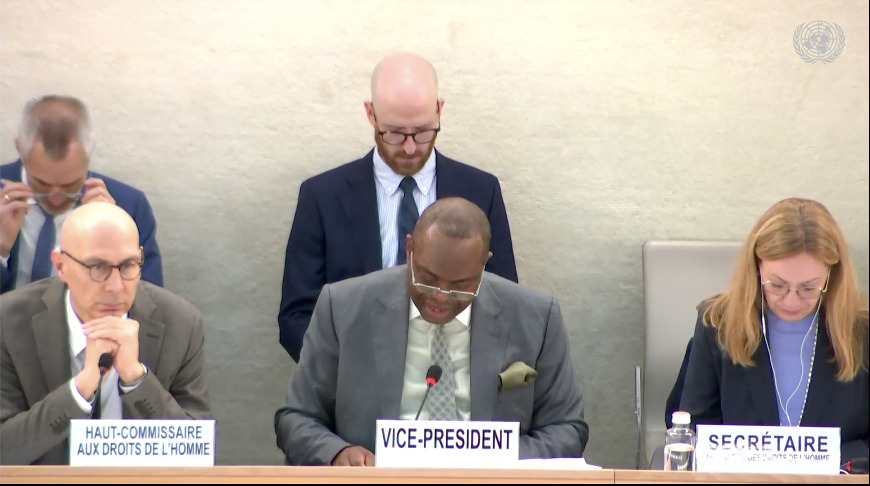
By Jui Dharwadkar / GICJ
Executive Summary
On 5 March 2025, country representatives, human rights organizations, and delegates engaged in an Enhanced Interactive Dialogue on the report prepared by the High Commissioner titled “Human Rights and Transitional Justice”. The report, submitted pursuant to Human Rights Council resolution 51/23, identifies examples of effective practices and lessons related to transitional justice processes, in the context of sustaining peace and sustainable development, particularly with regard to Sustainable Development Goal 16. It focuses on victim-centric, gender inclusive and innovative approaches to contribute to a tangible and transformative impact on vulnerable communities.
In the context of countries which have witnessed grave human right violations, the dialogue highlighted principles of accountability and region-specific mechanisms as the pillars of sustainable development and peace. The discussion recognized practical challenges to the realization of transitional justice and reinforced its institutionalization through victim participation, reparation and non-repetition. The contributions of grass-root organizations, specifically by the youth and women, were underscored in overcoming these threats.
The Geneva International Centre of Justice (GICJ) supports the High Commissioner’s report and calls on States and civil society organizations to reinforce urgency of taking action. Transitional justice is instrumental in bringing sustainable development and long-lasting peace in challenging contexts. GICJ strongly urges State institutions to comply with the recommendations suggested by the High Commissioner’s Report and highlight the need for the integration of youth in aiding the process.
Background
Transitional justice is a pragmatic human-rights policy tool for national stakeholders, aimed at enhancing peace and security, ensuring accountability, and fostering sustainable development. It covers the full range of processes and mechanisms a society employs to address the legacy of large-scale past conflict, repression, and violations,with the goals of ensuring accountability, serving justice, and achieving reconciliation. Historically, these mechanisms have included judicial and non-judicial approaches such as prosecutions, truth-seeking initiatives, reparations programs, and institutional reforms. The United Nations has been instrumental in advocating for and supporting these processes globally, recognizing their significance in healing divided societies and preventing the recurrence of conflicts.
Such processes must be context-specific, nationally owned, and focused on the needs of victims. By then connecting, empowering, and transforming societies, they can contribute to lasting peace. The main countries in question include Afghanistan, the Central African Republic, Colombia, the Democratic Republic of the Congo, El Salvador, the Gambia, Guatemala, Iraq, Lebanon, Liberia, Mali, Mexico, Nepal, South Sudan, Sri Lanka, the Sudan, the Syrian Arab Republic, Tunisia, and the Western Balkans, including Kosovo.
The primary objective of this dialogue was to underscore the importance of integrating human rights and transitional justice into the broader agenda of sustainable development. By sharing experiences and best practices, the Council aimed to highlight how these mechanisms can contribute to achieving SDG 16, which focuses on promoting peaceful, inclusive societies, ensuring access to justice for all, and building effective, accountable institutions. Key stakeholders in this dialogue included member states, civil society organizations, victims' groups, and international bodies, all of whom play vital roles in designing and implementing transitional justice processes. Recent developments, such as the increased recognition of the interconnections between transitional justice, sustaining peace, and sustainable development, have further emphasized the need for such comprehensive discussions.
Summary of the OHCHR report on transitional justice
In accordance with Human Rights Council resolution 51/23, this report was written by the Office of the United Nations High Commissioner for Human Rights (OHCHR), …. With an emphasis on Sustainable Development Goal 16, the report seeks to identify best practices and lessons gained in transitional justice systems, specifically in maintaining peace and advancing sustainable development. It mainly collected information from regional consultations with national authorities, victims' associations, civil society organizations, and transitional justice specialists from more than 77 countries.
The report points out the effects of not implementing transnational justice. For instance, a lack of accountability mechanisms such as the lack of political will and the politicisation of transitional justice weakens efforts to address human rights violations. Additionally, weak institutional frameworks hinder the sustainability and effectiveness of transitional justice mechanisms. And finally, narratives of negationism and historical revisionism obstruct truth and reconciliation efforts.
The report discusses the various mechanisms adopted by States to encourage changes that enforce justice. Certain practices are identified by the report such as laying the foundation for justice and accountability for accurate documentation of grave human rights abuses. In addition, reaching out to marginalised victims who are to ensure inclusivity fortifies the legal system and guarantees thorough remedy. The report also discussed how advocacy conducted by victims has been crucial in achieving legal recognition of victims' rights and influencing policy changes. Immediate support, such as legal and psychiatric treatment, increases the efficacy of transitional justice programs. Transitional justice initiatives can be advanced by interacting with international human rights organizations, particularly in areas where domestic procedures are still inadequate or ineffectual. Moreover, grassroots efforts to preserve historical memory play a crucial role in preventing revisionism and securing recognition of past atrocities. These strategies collectively contribute to strengthening transitional justice mechanisms.
The OHCHR Report recommends certain steps to ensure the implementation and sustainability of transitional justice. These include:
- Governments should institutionalise victim-centered approaches by adopting legal and policy frameworks that support truth, justice, and reparation. Dedicated long-term support is necessary to create a conducive environment for transitional justice initiatives, ensuring protection for activists and stakeholders.
- Transitional justice should be integrated into national development plans to align with broader peace and development strategies, using data-driven approaches to track progress.
- The international community should enhance support for grassroots organizations and victims’ associations that lead transitional justice efforts.
- Monitoring and evaluation mechanisms should be strengthened to assess the long-term impact of transitional justice on victims and affected societies.
Enhanced Interactive Dialogue
Opening Statements
To begin the Enhanced Interactive Dialogue, the Vice-President of the Human Rights Council, Mr. Paul Empole Losoko Efambe, reiterated the focus of the Dialogue on lessons learnt and good practices in the area of transitional justice in the context of peacekeeping and sustainable development (particularly Sustainable Development Goal 16).
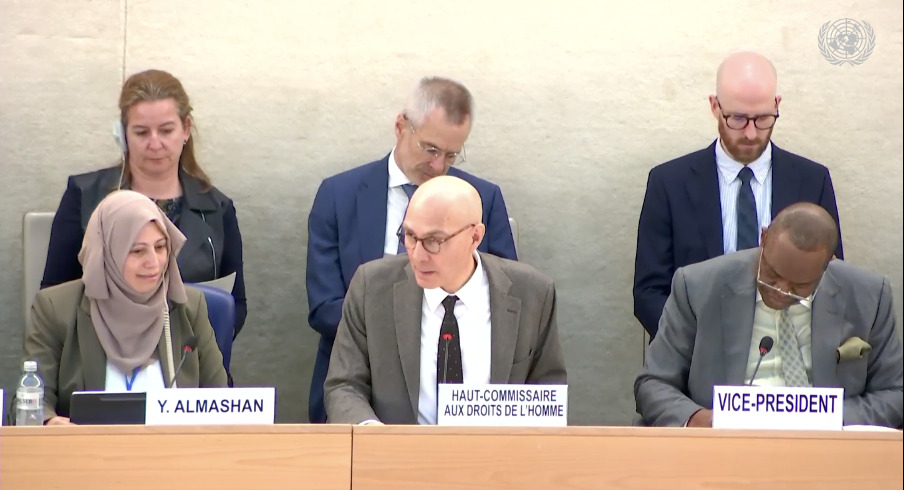
The United Nations High Commissioner for Human Rights, Mr. Volker Türk introduced the report on Transitional Justice, which outlines powerful practices of transitional justice that are victim-centred, inclusive, gender-responsive and innovative. He emphasized that in this fragmented world, transitional justice is a creative and essential problem-solving approach needed to build durable peace. He also expressed that the wisdom of transitional justice is captured in the Lebanese slogan, “Remember to not repeat”.
The delegate of UNDP, Ms. Agi Veres also shared UNDP’s role in supporting transitional justice in over 16 countries and the integration of development-oriented approaches to both address past harms and foster inclusive and peaceful societies. She shared that mental health and psychosocial support are key priorities embedded across crisis prevention and peacebuilding efforts in 21 countries, including in some transitional justice contexts.
Former member of the Colombian Truth Commission and head of the Choco Victims Unit, Mr. Leyner Palacios Aspirilla, took the floor to highlight the challenges Colombia’s transitional justice continues to face. He ended his statement urging the international community to pursue the joint responsibility to find a solution to the armed conflict in Colombia.
Next, various country and region representatives shared their involvement in transitional justice contexts and shared their insights regarding the process.
Country and Regional Statements
Various countries welcomed the practices outlined in the OHCHR report and shared their involvement in supporting transitional justice contexts.
The delegate of the European Union welcomed the OHCHR report and reiterated the European Union’s commitment to transitional justice initiatives worldwide, and the human rights-based and victims-centred approaches to transitional justice.
The delegate of Ghana, representing the Group of African States (African Group) commended the practices outlined in the OHCHR report. Additionally, she highlighted the African Union Transitional Justice Policy adopted in 2019 which provides a framework for addressing past human rights violations and fostering reconciliation, as well as the partnership between the African Union and the European Union launched to assist with transitional justice in Africa.
Some countries also took the opportunity to share how transitional justice looked like in their contexts. The delegate of Iraq shared how transitional justice was enshrined through legislation and establishment of many institutions such as the National Accountability Office. He emphasised the need to promote the role of non-governmental organizations in a transitional justice context. The delegate of Algeria also provided her insight on Algeria’s transitional justice mechanisms, and emphasised that all transitional justice processes differ and there is no one-size-fits-all mechanism. She ended her statement by urging the High Commissioner to further analyse and promote models of national reconciliation in building and sustaining peace.
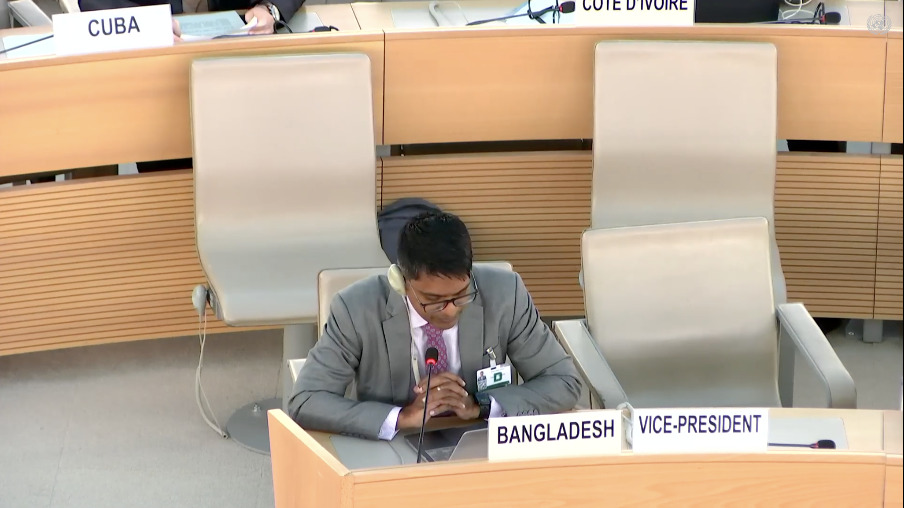
Drawing on the challenges they currently face, some countries called for more robust solutions to transitional justice contexts.
The delegate of Bangladesh cited the context of Myanmar, accountability mechanisms must aim to eliminate root causes and find sustainable solutions to the crisis, such as the repatriation of Rohingyas to their homeland.
The delegate of Afghanistan expressed deep concerns about the protracted insecurity and systematic violence it faces. He reiterated a call for establishing an independent investigative mechanism to strengthen institutional responses and enhance political will to provide redress for victims.
The delegate of the Democratic Republic of Congo also called on the High Commissioner to develop a regional approach to transitional justice to take stock of the complexity of the problem and the very diverse nature of stakeholders implicated in mass human rights violations.
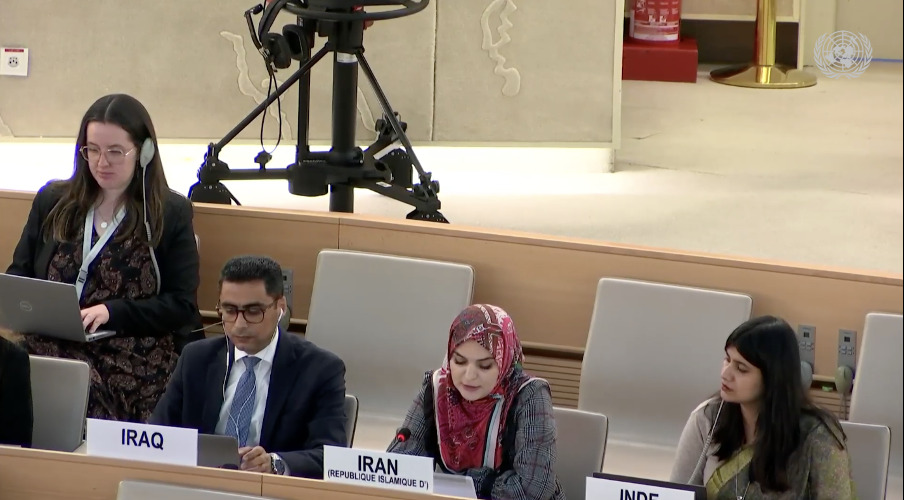
Some delegates also expressed more critical views on the OHCHR report, citing concerns relating to the possible infringement on national sovereignty.
The delegate of the Islamic Republic of Iran emphasised that such best practices should not challenge principles like national sovereignty and non-interference in internal affairs of a state. She added that having international institutions dictate how justice should be realised under the framework of transitional justice would be inappropriate, citing the example of universal jurisdiction.
The delegate of the Russian Federation also shared a more critical view of the OHCHR report, claiming that it faces an active imposition of legal doctrines not recognised by a global majority and that the report creates an impression that victims and non-governmental organisations are called upon to play a greater role than national authorities including national courts. She also emphasised that the Russian Federation categorically rejects the argument in Paragraph 53 on the rule of universal jurisdiction.
The delegate of China next asserted that transitional justice processes should be based on the UN Charter and universally accepted international law. She emphasised the need to uphold the national sovereignty of countries concerned such that transitional justice can be deemed legitimate. Finally, she added that the international community should aid with capacity-building and achieve peace through development, an aspect where China will play a constructive role.
Statements from Non-Governmental Organizations
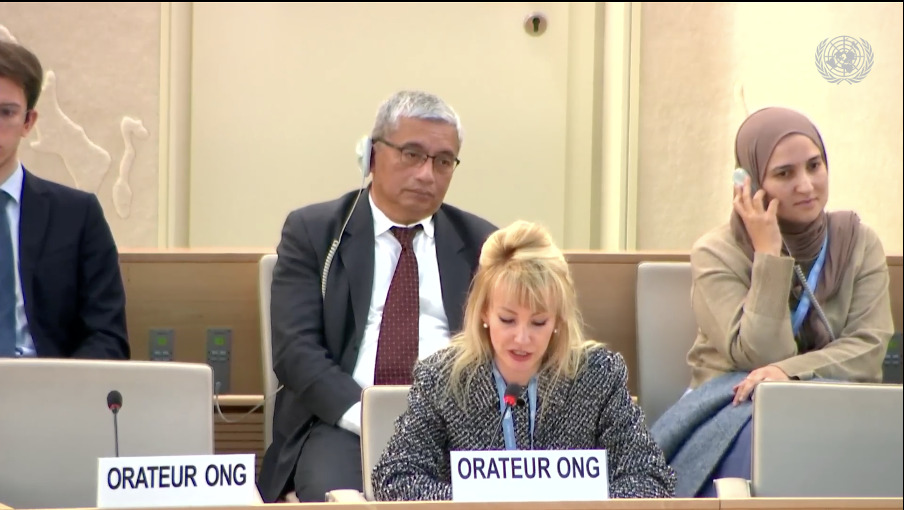
Various non-government organizations took to the floor to share their views on the OHCHR report and express calls for more robust transitional justice processes that reflect the demands of victims, including their right to accountability, effective remedy, and reparations. Statements also urged countries to recognise the potential of young people to lead and emphasized the importance of trauma-informed education. States and the international community are responsible for creating safe spaces for different stories to be heard.
Position of Geneva International Centre for Justice
Geneva International Centre for Justice (GICJ) welcomes the OCHCR’s report and extends its appreciation to the delegates who reiterated their commitment to transitional justice during the Enhanced Interactive Dialogue.
We commend the best practices outlined in the report, which emphasise victim-centred, inclusive, and innovative transitional justice processes. While tailoring transitional justice mechanics to the specificities of each context, it remains crucial to adopt an approach that not only places victims at the centre of the pursuit of accountability and justice, but is also inclusive and participatory. We welcome the insistence on empowering youths to be part of the transitional justice process, and reiterate the importance of youth leaders for building durable peace.
With regards to concerns raised about challenges to national sovereignty, we urge countries to take into account the exigencies of achieving accountability, healing and justice for victims in transitional justice contexts, and the destabilising consequences of such processes are delayed or subordinated.
We urge all States concerned to take into account the measures recommended by the OHCHR to pave the way toward just and sustainable peace. In this regard, we would also like to call on States to lend their support (in ways such as capacity-building or exchanging best practices) to countries currently undergoing transitional justice contexts.
#GICJ #Geneva4Justice #GenevaCentreforJustice #TransitionalJustice #VictimCentredApproaches #Peacebuilding




